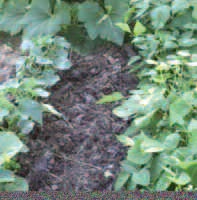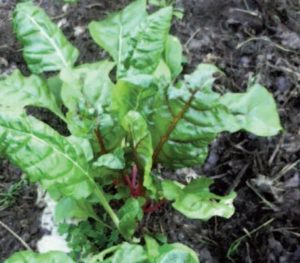GARDEN WORKS: Could this be an answer to a free, locally-available source of nutrients for your garden?
 GARDEN WORKS
GARDEN WORKS
by Emily Cates
Every now and then a reader makes a suggestion for these garden articles, and I always welcome ideas and discussion- even criticism. The other day, though, someone brought something to my attention that I believe we should look closely at and really consider. If anything, I think we should at least start a conversation about it, as there is a great possibility to positively impact our local community.

The “free” mulch placed between rows in Ann Austin’s garden. Photo courtesy of Emily Cates
So, I was talking with Ann Austin the other day. She and her son Eric live on China Lake and take frequent walks on the causeway. They were walking and talking and had a realization while looking at the shoreline: As one examines that end of the lake, it is apparent that there is an excess of organic matter that washes up on the beach over by the Landing and northeast shore. It is a beautiful beach in a prime location, though marred by the buildup. “Could we”, thought Ann, “turn this unsightly mess into something useful?” After all, she has personally seen the benefits when this organic matter washes up on her property and she rakes it up and uses it as a mulch and soil amendment. “The best part,” she adds, “is that it’s free and there is no worry of adding weed seeds to the garden.” I have seen her gardens and concur that they are thriving and beautiful, with minimal weeds. See for yourself in the pictures in this article!
The benefits of using fresh-water seaweeds in the garden and compost pile have been known anecdotally to gardeners for ages, though researchers have recently begun to study them more closely. In addition to being a good source of nitrogen, potassium, phosphorus and minerals, fresh-water weeds and algae can be applied without the danger of excess salt, like what is found in ocean plants such as kelp. Since the freshwater seaweeds live in the water, there are no terrestrial weed seeds that will grow in a garden. Some lakes and ponds that are overrun with invasive or excessive aquatic plants are weeded mechanically, and as long as these plants are applied on soil well away from water bodies, they can be a great asset to building the soil. (Even pond scum from that mosquito-infested swamp in your backyard could theoretically be worth it’s weight in a bag of fertilizer from the garden store- if you’re adventurous!) Need convincing? Check out this link about using freshwater seaweeds: http://homeguides.sfgate.com/freshwater-seaweed-gardens-89607.html and pond scum: https://www.gardeningknowhow.com/composting/ingredients/pond-scum-garden-fertilizer.htm.
If you live within sight of China lake, there is a good chance you pass by this potential resource for your garden every day. I know I have, and the thought of driving several miles in the opposite direction to haul a load of manure while this local supply of nutrients sits untapped seems silly to me. It’s no secret that China Lake- like many others with agricultural activities near their watersheds- has an excess of nutrients as a result of runoff. Why not recycle these nutrients as they manifest themselves in the organic matter of aquatic plants?

Some of the many healthy plants in Ann Austin’s garden. Photo courtesy of Emily Cates
I have observed that the area by The Landing is cleaned annually and the municipal workers haul off the debris. Of course their efforts are appreciated and I think they do a good job, but I also notice that the problem persists into other times of the year — especially when gardens are ready for mulching and amendments. Could gardeners load themselves up with a few buckets or so of the stuff? I’m not talking about dump truck loads, just enough for the average resident’s garden and flower beds.
On the other hand, I do have some questions that I am hoping will contribute to a meaningful community discussion. First of all, what’s in the stuff? Surely it’s loaded with nutrients, but what else? I would appreciate an in-depth analysis of the material to ensure there are not elevated levels of harmful substances that are included in what runs off into the lake- such as heavy metals, pesticides, petroleum products, sewage, pharmaceuticals, and even radioactive “hot particles”. These contaminants are persistent in our environment, and most do not normally break down in the average compost pile. Since many folks and myself are conscientious of what we put in our bodies, certainly the sentiment would ring true in our gardens as well.
Secondly, is it legal to harvest the organic matter? If so, how much is permissible to collect? At what times would gathering it be preferred? Perhaps this activity could take place in a time and manner that would not adversely affect local businesses, The Landing in particular.
Lastly, and most importantly, what is the ecological impact? Old-timers reminisce how this area of the lake was once clear and the preferred place for swimmers, but claim the current problem began when Rte. 137 was built through the wetland to bypass the village. Would regular harvesting and utilization of the buildup prove beneficial? Would it improve the quality of the water and aesthetics of the lake? Or would it have unanticipated consequences? Since I do not have the answers to these questions, I am calling on everyone with notions on how to improve our community to please contribute to this discussion if you can.
In conclusion, I’ll let us reflect on these thoughts: Could we solve our problem of a beach with an unattractive attribute and make it into something useful and pleasant? Ideally, we could envision a cleaner, more appealing causeway and shorelines that could be enjoyed to their full potential, along with our surrounding community filled with vibrant, beautiful gardens.
Responsible journalism is hard work!
It is also expensive!
If you enjoy reading The Town Line and the good news we bring you each week, would you consider a donation to help us continue the work we’re doing?
The Town Line is a 501(c)(3) nonprofit private foundation, and all donations are tax deductible under the Internal Revenue Service code.
To help, please visit our online donation page or mail a check payable to The Town Line, PO Box 89, South China, ME 04358. Your contribution is appreciated!


Leave a Reply
Want to join the discussion?Feel free to contribute!